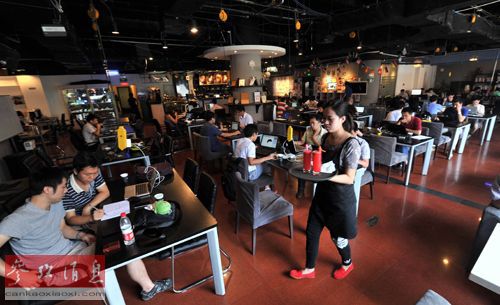The hot Japanese media of "coffee shop entrepreneurship" in China say that due to the surge in venture capital
The reference News Network reported on September 8.
Japanese media say the institutional malaise of putting too much emphasis on large state-owned enterprises is one of the structural problems in China's economy. The government tries to solve this problem by promoting private entrepreneurship. In the university district of Beijing, there is a "Entrepreneurship Street", which brings together a large number of entrepreneurs who are exploring and practicing Silicon Valley.
Zhongguancun, located in northwest Beijing near Tsinghua University, Peking University and other top Chinese universities, has a 200-meter-long "Entrepreneurship Street", Japan's Asahi Shimbun reported on September 6. In the coffee shop here, you can stay all day with only a cup of coffee. With power, Wi-Fi, printers and separate desks and chairs, young people can turn on their personal computers to work, just like working in a new company.
Wei Qingchen, who is busy in front of a computer in a T-shirt on the second floor of Garage Coffee, an old startup coffee shop, is an entrepreneur, according to the report. "if there is a technical problem, there is always an expert around to help," he said. "
Wei Qingchen, who originally worked for a large enterprise, resigned to start a business because he "wanted to help office workers reduce stress". He is currently developing software that can analyze what customers say to select decompression music from the database that suits him. Some investors are optimistic about its prospects and have invested 1 million US dollars.
According to the report, there are also many offices of incubators and investment institutions that provide formalities services for entrepreneurs on Entrepreneurship Street. Zhongguancun, which is concentrated by electronics stores and IT companies, was once ridiculously called "fake Akihabara" in Japan, but in recent years it has become known as "China's Silicon Valley".
The upsurge in venture capital is driving the entrepreneurial craze among young people. A total of 1360 cases were disclosed in China's domestic venture capital market last year, with a total amount of US $12.7 billion, both setting a new record, more than 10 times that of Japan, according to data from Chinese investment services company Investment China Group. Industry experts said: "even if there is no background, no relationship, as long as you have the ability to start a business, now there is finally such an environment."
According to the report, instead of working as a small clerk in a large enterprise, it is better to start a small company as the boss. The Chinese already have a strong spirit of independence. The full support of the government has added to the fire.
In May, Chinese Premier Li Keqiang patronized 3W Coffee on Entrepreneurship Street. The scene of Premier Li sipping vanilla cappuccino while chatting with entrepreneurs of online financial companies has been widely reported in the media.
According to the report, the Chinese government's worry is to ensure employment. The number of college graduates in China this year, including college graduates, has reached an all-time high of 7.49 million, and existing enterprises have been unable to provide suitable jobs for this army of workers. So last fall, the Chinese government put forward the slogan of "mass entrepreneurship and mass innovation" and launched a series of policies to support entrepreneurship, such as simplifying company registration procedures.
But the protagonist of China's entrepreneurial craze is the business model known as "O2O" (online to offline), which makes the Internet a foreground for offline transactions. Although there are innovative services such as door-to-door cooking, there is still a big gap compared with Silicon Valley in the United States, which is dominated by technological innovation.
It is reported that the shift from relying on the government and state-owned enterprises to relying on the market is China's signature reform policy. But the world is worried about China's slowing economic growth. In August, after the collapse in the Chinese stock market, venture capital also showed signs of a sharp decline. Is China's entrepreneurial craze a flash in the pan, an empty cry with big thunder and little rain, or can it give birth to technologies and enterprises that change the world? This is about the future of China's economy.

File photo: in the garage cafe of the entrepreneurial service agency located in Zhongguancun Entrepreneurship Street in Beijing, entrepreneurs are exchanging and seeking cooperation opportunities.
Important Notice :
前街咖啡 FrontStreet Coffee has moved to new addredd:
FrontStreet Coffee Address: 315,Donghua East Road,GuangZhou
Tel:020 38364473
- Prev

Coffee crisis with tricky tastes and fragile varieties
The price of coffee is forecast to rise by 25% by 2050. The livelihoods of 25 million people may depend on whether scientists can find a way to protect fragile coffee plants and berries. A whole year's coffee harvest may depend on the florescence of just a few days, when plants are particularly vulnerable to extreme weather. Last year, coffee leaf rust caused coffee farms in Nicaragua
- Next

Save Coffee half of the arable land for coffee production will disappear by 2050
It's hard to imagine what it would be like without this rich, bitter black liquid in a world that consumes 1.5 billion cups of coffee a day. But it is not impossible for such a world without coffee to become a reality. Scientists tell us that half of the arable land needed to produce coffee will disappear by 2050. Arabica, the most consumed coffee variety in the world, will be in the wild by 2080.
Related
- What brand of black coffee is the most authentic and delicious? what are the characteristics of the flavor of the authentic Rose Summer Black Coffee?
- Introduction to the principle and characteristics of the correct use of mocha pot A detailed course of mocha pot brewing coffee is described in five steps.
- Which is better, decaf or regular coffee? how is decaf made?
- How much is a bag of four cat coffee?
- How about four Cat Coffee or Nestle Coffee? why is it a cheap scam?
- Which is better, Yunnan four Cats Coffee or Nestle Coffee? How about cat coffee? is it a fake scam? why is it so cheap?
- How about Cat Coffee? what grade is a hoax? which instant coffee tastes better, four Cat Coffee, Nestle Coffee or G7 coffee?
- Process flow chart of coffee making-Starbucks coffee making process what coffee tastes good at Starbucks
- The top ten best coffee beans in the world Rose summer coffee or Tanzanian coffee tastes good
- Yunnan four cat coffee is good to drink?_four cat coffee is a big brand? four cat blue mountain coffee is fake?

